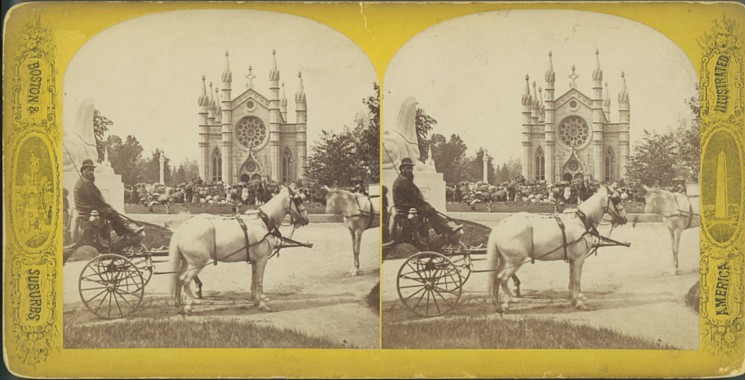Decoration Day Celebrated at Mount Auburn

Decoration Day was first observed on May 30th, 1868 at Arlington National Cemetery. A month earlier, General John Logan, commander in chief of the Grand Army of the Republic, officially designated May 30 for the purpose of “strewing with flowers or otherwise decorating the graves of comrades who died in defense of their country during the late rebellion.” The south practiced separate observance days until 1971 when Congress passed an act formally proclaiming the last Monday in May as Memorial Day to honor veterans from all wars.
At Mount Auburn, this day of remembrance has always been a busy day for visitation. The large crowd gathered before Bigelow Chapel on Decoration Day in the historic image above illustrates the importance of the holiday in the years following the end of the Civil War. We continue to honor this tradition with our annual “Service of Commemoration” each May.
The following address was read by Thomas Wentworth Higginson at Mount Auburn on the 5th anniversary of the end of the Civil War. It is a stirring oration honoring the men who served.
DECORATION DAY ADDRESS AT MOUNT AUBURN CEMETERY MAY 30, 1870
WE meet to-day for a purpose that has the dignity and the tenderness of funeral rites without their sadness. It is not a new bereavement, but one which time has softened which brings us here. We meet not around a newly-opened grave, but among those which nature has already decorated with the memorials of her love. Above every tomb her daily sunshine has smiled, her tears have wept; over the humblest she has bidden some grasses nestle, some vines creep, and the butterfly—ancient emblem of immortality—waves his little wings above every sod. To nature’s signs of tenderness we add our own. Not “ashes to ashes, dust to dust,” but blossoms to blossoms, laurels to the laureled.
The great Civil War has passed by – its great armies were disbanded, their tents struck, their camp-fires put out, their muster-rolls laid away. But there is another army whose numbers no presidential proclamation could reduce; no general orders disband. This is their camping-ground, these white stones their tents, this list of names we bear is their muster-roll, their camp-fires yet burn in our hearts.
Leave a Reply